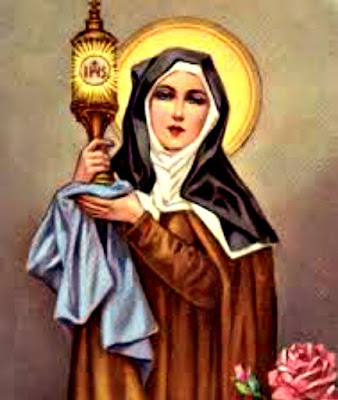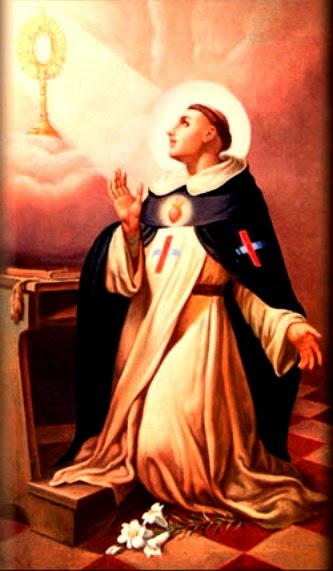BLESSED ROSA VENERINI
 ROSA VENERINI was born in Viterbo, on February 9, 1656. Her father, Goffredo, originally from Ancona, after having completed his doctorate in medicine at Rome, moved to Viterbo where he practiced the medical profession brilliantly in the Grand Hospital. From his marriage to Marzia Zampichetti, four children were born: Domenico, Maria Maddalena, Rosa and Orazio.
ROSA VENERINI was born in Viterbo, on February 9, 1656. Her father, Goffredo, originally from Ancona, after having completed his doctorate in medicine at Rome, moved to Viterbo where he practiced the medical profession brilliantly in the Grand Hospital. From his marriage to Marzia Zampichetti, four children were born: Domenico, Maria Maddalena, Rosa and Orazio.Rosa was naturally gifted with intelligence and an uncommon human sensibility. The education that she received in her family allowed her to develop her many talents of mind and heart, forming her in steadfast Christian principles. According to her first biographer, Father Girolamo Andreucci, S.I., she made a vow to consecrate her life to God at the age of seven.
At age twenty, Rosa raised questions about her own future. The women of her time could choose only two orientations for their lives: marriage or the cloister.
In the autumn of 1676, on the advice of her father, Rosa entered the Dominican Monastery of St. Catherine, with the prospect of fulfilling her vow. However, she remained in the monastery for only a few months because the sudden death of her father forced her to return to her suffering mother.
In the years immediately following, Rosa had to bear the burden of serious events for her family: her brother Domenico died at only twenty-seven years of age; a few months later her mother died, unable to bear the sorrow.
In the meantime, her sister, Maria Maddalena, married. There remained at home only Orazio and Rosa, by now twenty-four years old. Challenged by the desire to do something great for God, in May of 1684, the Saint began to gather the girls and women of the area in her own home to recite the rosary. The way in which the girls and women prayed, and above all, their conversation before and after the prayer, opened the mind and heart of Rosa to a sad reality: the woman of the common people was a slave of cultural, moral and spiritual poverty. She then understood that the Lord was calling her to a higher mission which she gradually identified in the urgent need to dedicate herself to the instruction and Christian formation of young women.
On August 30, 1685, with the approval of the Bishop of Viterbo, Cardinal Urbano Sacchetti and the collaboration of two friends, Gerolama Coluzzelli and Porzia Bacci, Rosa left her father’s home to begin her first school. The first objective of the Foundress was to give the girls of the common people a complete Christian formation and prepare them for life in society. Without great pretense, Rosa opened the first “Public School for Girls in Italy”. From 1692 to 1694, she opened ten schools in Montefiascone and the villages surrounding Lake Bolsena. Her duties became intense, consisting of travels and hard work interwoven with joys and sacrifices for the formation of new communities.
Rosa Venerini died a saintly death in the community of St. Mark’s in Rome on the evening of May 7, 1728. She had opened more than forty schools. Her remains were entombed in the nearby Church of the Gesù, so loved by her. In 1952, on the occasion of her Beatification, they were transferred to the chapel of the Generalate in Rome.
Her Spirituality
During her entire life, Rosa moved in the ocean of the Will of God. She said, “I feel so nailed to the Will of God that nothing else matters, neither death nor life. I want what He wants; I want to serve Him as much as pleases Him and no more”.
The crises of adolescence, the perplexity of youth, the search for a new way, the institution of the schools and the communities, the rapport with the Church and the world—all were oriented to the Divine Will.
Prayer was the breath of her day. Rosa did not impose on herself or her Daughters long vocal prayers, but recommended that the life of the Maestre, in the practice of the precious education ministry, be a continuous speaking with God, of God and for God.
Intimate communion with the Lord was nourished by mental prayer, which the Saint considered “essential nourishment of the soul”. In meditation, Rosa listened to the Teacher who taught along the roads of Palestine and in a particular way from the height of the Cross. With her gaze upon the crucifix, Rosa always felt more strongly her passion for the salvation of souls. For this reason, she celebrated and lived daily the Eucharist in a mystical way. In her imagination, the Saint saw the world as a great circle; she placed herself in the center of it and contemplated Jesus, the immaculate victim, who offered Himself from every part of the world to the Father through the Eucharistic Sacrifice.
She called this means of elevating herself to God “The Greatest Circle”. With incessant prayer, she participated spiritually in all the Masses being celebrated in every part of the world. She united with love the sufferings, hard work and joys of her own life to the sufferings of Jesus Christ, concerned that His Precious Blood would not be shed in vain.




Comments
Post a Comment
Comments are moderated and are published at the blogger's discretion.